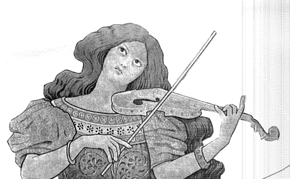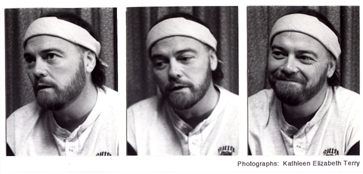 |
 |
 |
 |
EVENTIDE
c/o NIGHTWATCH RECORDING
PO BOX 721010
BERKLEY, MI 48072
TEL: 248-399-1070
FAX: 248-399-1542
WEBSITE: www.nightwatchrecording.com
e-mail: inngate@nightwatchrecording.com
Editor: Joseph Physician
Eventide Staff:
Jean Elliot
David James
Donna Physician

FROM THE EDITOR
What defines music? What makes a collection of notes worthy of the benefit
of our listening? Or is it the other way around? The debate has raged probably
as long as music itself. I picture two Neanderthals, one beating the tightened
skin of yesterday’s supper while the other grunts without success for him
to pick up the beat to 4/4 rhythm. Or, the scenario between my dear grandmother
and me so many years ago, with her insistence that I ‘turn that racket
down’ so she can better hear her ‘Best of Polka’ record.
So, then, perhaps music is defined by the individual? ...Or then again, is music
an end in itself regardless of any individual? Hmm... Does philosophy have a
role in defining music? No doubt, but there are others that could better expound
on that connection than I. At any rate, as an ardent music lover, I’m ready
to explore the phenomenon of music in our lives (in particular, in the context
of the music of NIGHTWATCH RECORDING) through the pages of EVENTIDE and
invite you to join me in this quest with your comments and suggestions.
All things then being ready if our minds be so, we launch our ‘meaning
of music’ investigation with this issue’s interview of NIGHTWATCH
RECORDING founder and New World Renaissance Band vocalist, Owain Phyfe. Please
stay tuned.
WHAT IS MUSIC? WHAT IS ART?
An Interview with Nightwatch Founder, Owain Phyfe
In recent radio interview broadcasts, respectively, with Jim Bloom of Cleveland,
Ohio area station WKSU, and later with WXYT Detroit News Talk Radio host Mark
Scott, Owain Phyfe summed up his passion for music in soliloquy with the following
prose:
“What is music?? What is art?
‘Art is the subjective re-creation of reality
based upon
the fundamental metaphysical value judgments of the artist.’
Show me works of an artist,
and I’ll show you his value judgments.
Show me the art and music of a society,
and I’ll show you the value judgments of that society.
Today’s art and music demonstrates quite eloquently
the value judgments of today.
namely:
that man is some kind of tragic intruder on this planet,
that knowledge is uncertainty,
that moral judgment is immoral,
that mediocrity is to be rewarded,
that the mundane and even the depraved are to be exalted,
that in order to survive
a man must...
join a gang,
and thereafter, he may not live for his own sake.
Future scholars will evaluate the art and music of our day
and our day will come to be known
as the age
of envy and guilt.
But what about us?
What about me, I’m an artist.
But what are my value judgments?
What are yours?
I do value greatly
that which I find interwoven
in the art and music of the Renaissance,
namely:
the death of the dictatorship of mysticism,
the end of the tyranny of faith and force,
the proclamation that man’s mind is not impotent,
and yes,
given the proper stimulus, neither is the rest of him,
the rebirth, the rediscovery of reason,
the knowledge that man by his very nature
must exist in freedom,
and that freedom means freedom from compulsion,
that reality is real,
that truth and justice are possible,
and that love, my friends,
is a response to value
and cannot be given indiscriminately,
that virtue is worth discovering,
that man can be heroic,
that happiness is not to be sacrificed,
that life is an adventure worth living.”
On October 15, 1997, I shared a pitcher of red
ale with Owain Phyfe at one of our local watering holes in fashionable downtown
Berkley (Michigan) with a view to expanding upon the aforementioned radio interviews.
As the ale began to flow, so did the conversation:
EVENTIDE: So WHY did you write that piece of prose about art and music?
OWAIN PHYFE: pleasure ...for the pleasure of doing it.
EVENTIDE: Okay, let me re-phrase that: WHAT inspired you to write it?
PHYFE: ...I had just finished reading Ayn Rand’s book The Romantic Manifesto,
which I found to be a very liberating experience. A lot of the ideas contained
in my words are the result of her influence. The definition, in fact, of Art
itself, at the beginning, is her definition.
EVENTIDE: So, you refer to her book as a liberating experience, ...liberating
from what?
PHYFE: Ignorance mainly... Ignorance of the nature of art and what art
REALLY says about the Artist. I would recommend her book as a must read,
in particular, for anyone dealing in the Arts.
EVENTIDE: Which came first for you? The Renaissance music or Ayn Rand’s
influence?
PHYFE: I was already doing early music, Renaissance music, but I didn’t
understand yet why I was so attracted to it. Ayn Rand articulated that attraction
for me.
EVENTIDE: Which is?
PHYFE: The values contained therein.
EVENTIDE: Can’t one... just love a given piece of music, without analyzing
it?
PHYFE: I can’t... not any more.
EVENTIDE: So then... what are the values in your music?
PHYFE: Well... before you can discuss values, you need to discuss the purpose,
the very point of music.
EVENTIDE: Which is?
PHYFE: Contemplation. Music is much more than entertainment. It is the pleasure
of contemplation. This is the purpose of art. ...I would hope that our listeners
would find a kind of peaceful oasis in our music. I don’t mean that in
the sense of escapism. I mean, rather, in the pleasure of contemplation reaffirming
the idea that life holds for each one of us a spectrum of wonderful possibilities.
...Through my portion of input in the music of The New World Renaissance Band
and Nightwatch Recording, I am endeavoring to relate how a certain type of music
has touched and moved me. It is this same music which, in the same way, touched
and moved individuals among the generations of the most vibrant age in human
history, the Renaissance.
Now don’t misunderstand me here, this is important. I’m not looking
to turn the clock back. I have no desire to live in the past. Through our music
we have attempted to re-kindle the spirit of the Renaissance... in a
manner befitting the next renaissance.
EVENTIDE: ...And the values in your music?
PHYFE: Again... I would hope that our listeners would find a fascination with
the adventure and discovery of life... in the context ...of honor and the pursuit
of virtue.
Above the din of the 30 or so patrons, strains of an electric
guitar could be heard emanating from the corner jukebox, which naturally led
into my next question.
EVENTIDE: Is there any modern/contemporary music that you like?
PHYFE: Yes, some, but most of it is emotionally irrelevant for me.
EVENTIDE: Emotionally irrelevant?
PHYFE: All music is the audio equivalent to emotion. There are certain emotions
that I just don’t care to experience, at least, not for very long.
EVENTIDE: Okay, it makes sense that emotion is evoked from the listener, but
is it always relevant? I mean, what if you just like the music?
PHYFE: It’s not a matter of just liking or just disliking. Music affects
us whether we are aware of it or not, sometimes positively, sometimes negatively,
but always emotionally. Some people, for example, might ‘just like’
feeling, say, irrationally pugnacious. I don’t.
EVENTIDE: Does this mean that you feel negatively about rock ‘n roll, for
example?
PHYFE: Not necessarily. That’s too broad of a statement. I will say this,
however, that much of the pop music of recent years, with it’s orientation
towards blues, does contain a reoccurring theme: that being the exalting of
the ‘life on the street’ experience. My personal experience has taught
me that the ‘life on the street’ syndrome has more to do with bitterness
than with enlightenment. It’s a place, an emotion, where I simply don’t
wish to go.
EVENTIDE: So, you’re looking for enlightenment in music?
PHYFE: I am looking for that which is of value. I don’t like participating
in art or music whose underlying value judgments are a contradiction to that
which is most valuable and desirable in life.
EVENTIDE: Couldn’t someone’s values just be different than yours?
PHYFE: You may think so and they may think so, but real values are IDENTIFIED
metaphysically, in other words, by the nature of human existence, not by anyone’s
opinion.
EVENTIDE: That’s your opinion.
PHYFE: (laugh) No, that’s a fact and ostensibly so. And that, by the way,
is why Ayn Rand’s writings are so important. She is the one who has done
all the groundwork, all the research in identifying the nature of human values.
...Her findings, I might add, would greatly enrich our culture, which happens,
at the moment, to be struggling through an immense value search. The vast majority
of people are passive to this and will go along with whatever is determined
for them by intellectuals, clergy, government officials, media personalities,
and yes, ARTISTS. The end results, or should I say, the values chosen, however,
will determine whether we enter into another ‘renaissance’ or another
‘dark ages.’
A long pause ensued, broken finally by the arrival of another
pitcher of ale. We continued along other lines.
EVENTIDE: Is there anything in which you disagree with Ayn Rand or her philosophy?
PHYFE: You mean from her book, The Romantic Manifesto?
EVENTIDE: Okay, yes.
PHYFE: Well, I thought that she underestimates the value of folk music as an
entry level stepping stone into the whole experience of music. Her criticism
of folk music in the context of performances of it often being too complacent
may, on the other hand, have some validity. Keep in mind, though, that this
area of disagreement is such a minute detail, in light of all her writings and
discoveries, that it should really be considered to be insignificant.
EVENTIDE: I happen to know that you have taken some flack from some of the purists
among the ‘early music’ community for your particular approach to
Renaissance and Medieval music. How would you answer those critics?
PHYFE: I’ve always used the expression: ‘We don’t do documentaries.’
On the other hand, I’m glad that there are musicians who choose to approach
early music from a purely scholarly level. This is valuable historically. That,
however, has never been our intent. ...The conflict here is one of the Classical
School versus the Romantic School. The Classical School must imitate
the past, to preserve it. The Romantic School has the freedom to create
for the future. Each musician must determine for himself where his gift lies.
EVENTIDE: Well, we’ve covered a lot of ground, but I have one final question:
Can you give us a peek as to the future plans at Nightwatch Recording? New recordings,
etc?
PHYFE: Yes, there are presently two CDs in the works. Cantiga is finishing up
their 2nd album in Houston right now. It was about half complete last year at
the time of Malcolm’s death. ...So it will include music from some of his
last recording sessions. For that reason alone, this will be a treasure for
all of us in the band. While they are winding up that project, I’ll be
recording the sequel to Sweet Was The Song which will be another collection
from the Renaissance lute song repertoire. Next year at the Sterling Renaissance
Festival in Owosso, NY, we hope to begin the fourth CD by the whole band. There
is just so much great repertoire out there that I get the feeling that we have
really only scratched the surface.
I got the feeling that we had only scratched the surface in our discussion
as well. Our last pitcher, however, was empty and the clock read 1:30 a.m. I
had quite a bit to ponder; art, values, the Renaissance, etc., and, can I drive
home?
I began wondering how I fit into this equation. Just what ARE my value judgments?
And, dear reader, as Owain’s soliloquy begs the question, “What are
YOURS?”
‘LIVE THE LEGEND’
AT BORDER’S BOOKS & MUSIC
Borders’ Books & Music will feature The New World Renaissance
Band’s first CD, Live The Legend, among its classical department
listening station recommendations beginning in late November. Do your ears a
favor and wander down to your local Borders’ for a free listen.
FOLK FESTIVAL HONORS
MALCOLM SMITH’S LEGACY
Those who attended the Kent State University Folk Festival on February
15, 1997 (Kent, Ohio) were witness to a touching tribute to the late NWRB/Cantiga
fiddle master Malcolm Smith. (Malcolm passed away in his sleep on Oct. 27, 1996.)
Saturday night’s featured performers Owain Phyfe, Stefano Pando, and Sasha
Raykov paused solemnly along with the 1500 other attendees as Malcolm’s
photograph flashed onto the auditorium screen and the sound of his fiddle filled
the air.
Our Malcolm was being honored along with others who passed away in 1996 for
their lifelong contribution to music. For many, it was their first opportunity
to hear what Malcolm achieved in the span of his short life.
Dear Nightwatch,
August 2, 1997
This is just a note to express our appreciation for the top-quality musical
product which you continue to release. It is nearly a year since your last title
Odyssey (Nightwatch No. 1006) first came out. That title immediately
captured the #1 Classical ranking here in the Detroit area and has remained
within the top 15 sellers EVERY week since then. On my latest report, July 28,
‘97, Odyssey grabbed the #3 spot, behind only the Shine soundtrack
and Agnus Dei, a very hot choral collection. Incidentally, your second
disc Where Beauty Moves And Wit Delights (Nightwatch No. 1002) ranked
#9 overall, and yet another, Sweet Was The Song (Nightwatch No. 1004,
ranked #33. This is out of many thousands of CD titles by world-famous artists
and ensembles who cannot begin to deliver the same kind of sales for us that
your product does, consistently.
Thanks again for recording well-produced discs of entertaining and enjoyable
music that people continue to ask for by name. Keep up the good work! My orders
are enclosed.
Sincerely,
Bill Close, Classical Buyer
HARMONY HOUSE RECORDS & TAPES*
*36 store retail chain, Michigan and Ohio
TWO ‘EARS’ ARE BETTER THAN ONE
Out of Ross, California, The BINAURAL SOURCE prides itself with
being the “World’s Only Catalogue of Exclusive Recordings for Headphone
Experiences.” That is, it offers ONLY recordings of sound and music recorded
by systems which accurately replicate the human hearing process; in other words,
which utilize two tiny omnidirectional microphones designed to function like
our own two ears. The resulting recordings offer 360 degree sound replication
and are best listened to on quality headphones.
Nightwatch Recording is proud to announce that Owain Phyfe’s lute song
collection Sweet Was The Song (recorded on the Aachen head system by
seven time Grammy award winner Eddie Wolfrum of Audiographics) has been selected
to join the ranks of The BINAURAL SOURCE’S technologically pristine, catalogue
offerings. For more information on binaural recordings, contact: THE BINAURAL
SOURCE, 1-800-934-0442 (outside the U.S., call 1-415-457-90520.
‘CESSES MORTELS’ VIDEO
GARNERS TOP HONORS
CINCINNATI, OHIO - Fifth column Production’s music video of Owain Phyfe’s
Cesses Mortels de Soupirer (from Nightwatch Recording’s Sweet
Was The Song ) recently won a national Telly award for “Best Music
Video” in the nation.
The Telly competition, based in Ohio, has for the past 18 years given recognition
to excellence in film and video. Judging by the other production companies that
entered, such Hollywood heavyweights as Columbia Pictures, Tristar Pictures,
Miramax Films and Jim Henson Productions, the Tellys have arrived at their own
measure of esteem.
The 8 minute video (actually shot on film) is replete with 16th century period
costuming and equally enchanting locations. Director Jamin Fite’s credits
include another award winner, “Medieval World”, which took second
place in the nation for ‘Best Drama.’
“When I first heard ‘Cesses’, the story came alive in
my minds eye. There was a richness, a vitality and a universal appeal to the
story,” said Fite.
Others contributing to the success of the video include Co-Producer and Editor,
David Baker of Make Believe Productions (The Incorporated) and Director
of Photography, Anthony “Spike” Simms (Presumed Innocent).
Fite and company have already begun preliminary work on their next video but
remain tight-lipped as to the subject, stating only that the piece will be a
‘classic’ from The New World Renaissance Band.